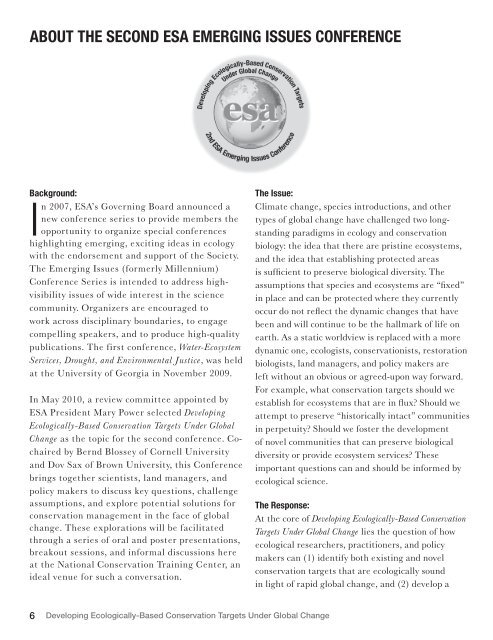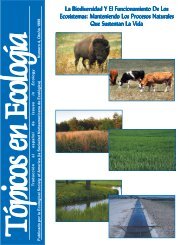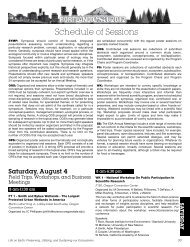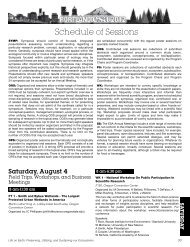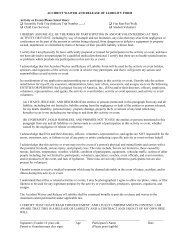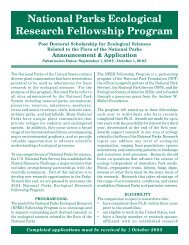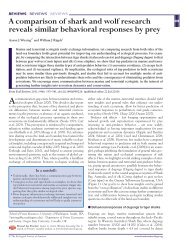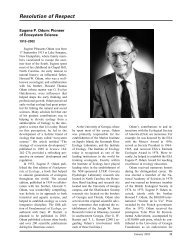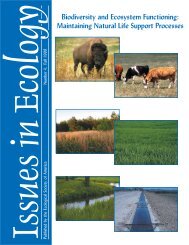here - Ecological Society of America
here - Ecological Society of America
here - Ecological Society of America
Create successful ePaper yourself
Turn your PDF publications into a flip-book with our unique Google optimized e-Paper software.
ABOUT THE SECOND ESA EMERGING ISSUES CONFERENCE<br />
Background:<br />
In 2007, ESA’s Governing Board announced a<br />
new conference series to provide members the<br />
opportunity to organize special conferences<br />
highlighting emerging, exciting ideas in ecology<br />
with the endorsement and support <strong>of</strong> the <strong>Society</strong>.<br />
The Emerging Issues (formerly Millennium)<br />
Conference Series is intended to address highvisibility<br />
issues <strong>of</strong> wide interest in the science<br />
community. Organizers are encouraged to<br />
work across disciplinary boundaries, to engage<br />
compelling speakers, and to produce high-quality<br />
publications. The first conference, Water-Ecosystem<br />
Services, Drought, and Environmental Justice, was held<br />
at the University <strong>of</strong> Georgia in November 2009.<br />
In May 2010, a review committee appointed by<br />
ESA President Mary Power selected Developing<br />
<strong>Ecological</strong>ly-Based Conservation Targets Under Global<br />
Change as the topic for the second conference. Cochaired<br />
by Bernd Blossey <strong>of</strong> Cornell University<br />
and Dov Sax <strong>of</strong> Brown University, this Conference<br />
brings together scientists, land managers, and<br />
policy makers to discuss key questions, challenge<br />
assumptions, and explore potential solutions for<br />
conservation management in the face <strong>of</strong> global<br />
change. These explorations will be facilitated<br />
through a series <strong>of</strong> oral and poster presentations,<br />
breakout sessions, and informal discussions <strong>here</strong><br />
at the National Conservation Training Center, an<br />
ideal venue for such a conversation.<br />
6 Developing <strong>Ecological</strong>ly-Based Conservation Targets Under Global Change<br />
The Issue:<br />
Climate change, species introductions, and other<br />
types <strong>of</strong> global change have challenged two longstanding<br />
paradigms in ecology and conservation<br />
biology: the idea that t<strong>here</strong> are pristine ecosystems,<br />
and the idea that establishing protected areas<br />
is sufficient to preserve biological diversity. The<br />
assumptions that species and ecosystems are “fixed”<br />
in place and can be protected w<strong>here</strong> they currently<br />
occur do not reflect the dynamic changes that have<br />
been and will continue to be the hallmark <strong>of</strong> life on<br />
earth. As a static worldview is replaced with a more<br />
dynamic one, ecologists, conservationists, restoration<br />
biologists, land managers, and policy makers are<br />
left without an obvious or agreed-upon way forward.<br />
For example, what conservation targets should we<br />
establish for ecosystems that are in flux? Should we<br />
attempt to preserve “historically intact” communities<br />
in perpetuity? Should we foster the development<br />
<strong>of</strong> novel communities that can preserve biological<br />
diversity or provide ecosystem services? These<br />
important questions can and should be informed by<br />
ecological science.<br />
The Response:<br />
At the core <strong>of</strong> Developing <strong>Ecological</strong>ly-Based Conservation<br />
Targets Under Global Change lies the question <strong>of</strong> how<br />
ecological researchers, practitioners, and policy<br />
makers can (1) identify both existing and novel<br />
conservation targets that are ecologically sound<br />
in light <strong>of</strong> rapid global change, and (2) develop a


